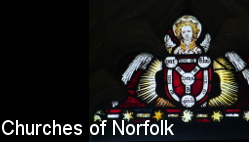
home I index I latest I glossary I introductions I e-mail I about this site
St Mary, Sparham
Follow these journeys as they happen at Last Of England Twitter.
St Mary, Sparham Sparham is a lovely village just to the north of the busy Norwich to Fakenham road, but it is such a peaceful place that you wouldn't know that the road was there. Its church sits right on the village street, and presents a slightly curious sight. The tall tower, Perpendicular aisles and clerestory are typical of a large East Anglian church rebuilt with merchant wealth towards the end of the medieval period. Money was left for rebuilding the nave and aisles from the mid-15th Century onwards, but this rebuilding seems to have taken a curious form, as we will see inside. However, the chancel is a long, low affair of the early 14th Century which, despite the later east window, seems quite out of proportion with the rest of the church. The window above the chancel arch in the east gable of the nave, which backlit the rood, has room to be enormous, and you can't help wondering if there was a plan to rebuild the chancel but the Reformation intervened. The church you step
into is wide, tall and full of light, with clear glass in
most of the windows and just an island of benches on the
brick floor of the nave. The large windows of the
clerestories form what are almost walls of glass. The
arcades below them march relentlessly eastwards, but
curiously, they narrow as they go. It is hard to
understand exactly why this is. Most likely the arcades
were extended westwards at the time of the 15th Century
rebuilding to enlarge the church, but not completed
before the new tower was begun, and perhaps this was not
without some confusion. At the east end of the arcades
there is another curiosity, the outlines of two blocked
windows below the clerestories. These must have been
there before the clerestories were added, to light the
rood. There is something similar not far off at Stibbard,
where the window is still open, but now only into an
adjoining aisle. The first scene is of a skeleton in a shroud, pointing to a font and saying in Latin I should have been as though I had not been born, I should have been carried from the womb to the grave. On the adjoining space, a female skeleton offers a male skeleton a flower, and the Latin inscription reads Man that is born of woman hath but a few days and is full of trouble. He comes forth like a flower and is cut down. These quotes are, of course, from the Book of Job, and the grisly scenes are parodies of two of the sacraments, Baptism and Matrimony. Curiously, they have had their faces scratched and their eyes gouged out by Anglican reformers in exactly the same way as happened to images of saints, and this only adds to their hideousness. In the days before the Reformation, William Mustarder was one of Sparham's priests. He died in 1490, which would put him in the right time frame for being the incumbent at the time the screen was installed. His figure brass lies not far from them, and he is wearing one of those high mass vestment collars typical of the pre-Reformation Church. Not surprisingly perhaps, the long, narrow chancel seems just as out of sorts with the nave inside as it does from the outside. The walls with their blank arcading lead to a strangely austere sanctuary below glass of 1948 by Terence Randall. It depicts Christ in Majesty flanked by St Michael and St George, and remembers Squadron Leader Arthur Sayer of the Royal Air Force, killed in action in 1944 and buried at Landet in Denmark. The figures are intensified by the clear glass surrounding them in Terence Randall's familiar and successful style. More than half a century later in 2007 came the equally good glass in the north aisle east window by Emma Blount. It depicts the Tree of Life and was placed in memory of Arthur Sayer's brother, a churchwarden here for many years. Simon Knott, June 2022 Follow these journeys as they happen at Last Of England Twitter. |
|
|||||||||||||||||||||||||||||||||||||||||||||||||||||||
home I index I latest I introductions I e-mail I about
this site I glossary
Norwich I ruined churches I desktop backgrounds I round tower churches
links I small
print I www.simonknott.co.uk I www.suffolkchurches.co.uk